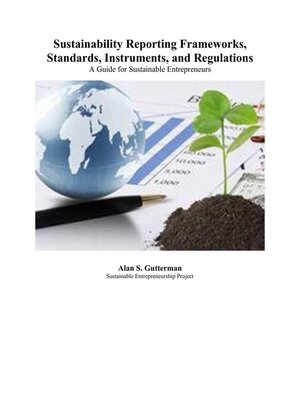Sustainability Reporting Frameworks, Standards, Instruments, and Regulations
ebook ∣ A Guide for Sustainable Entrepreneurs
By Alan S. Gutterman

Sign up to save your library
With an OverDrive account, you can save your favorite libraries for at-a-glance information about availability. Find out more about OverDrive accounts.
Find this title in Libby, the library reading app by OverDrive.



Search for a digital library with this title
Title found at these libraries:
| Library Name | Distance |
|---|---|
| Loading... |
To know whether sustainability initiatives and their related commitments are improving the company's performance it is necessary to have in place procedures for "communicating with stakeholders about a firm's economic, environmental and social management and performance". These communications take the form of "sustainability reporting", which is the preparation and dissemination of disclosures pertaining to "nonfinancial information" including information relating to climate change, water quality and quantity, ethical business practices, cybersecurity and supply chain management, as well as narrative discussions of what the company considers to be the material environmental, social, and governance ("ESG") risks to its business and how the company is managing those risks. Recently, nonfinancial information has been expanded in some jurisdictions to include disclosures and discussions regarding how a company's activities impact sustainable development in the society and environment beyond its immediate operations.
While progress on sustainability reporting frameworks and standards continues, it is important to avoid fragmented regulatory requirements and marshal support among jurisdictions all around the world for harmonized disclosures that are comparable, decision-useful and cost effective. Commentators have called on regulators to follow the principle of "equivalence" that has historically been applied to financial reporting and permit companies outside their own jurisdictions to use globally recognized standards to meet corresponding jurisdictional requirements, thus reducing the overall compliance costs for those companies. It will still take time for equivalence to take hold globally since while the European Union's Corporate Sustainability Reporting Directive, like the Global Reporting Initiative Standards, use the often controversial "double materiality" lens (i.e., requiring companies to report not only on risks and opportunities, but also impacts), the International Sustainability Standards Board Standards do not require reporting on impacts that are not determined to be financially material.
Reaching a consensus on how reporting standards work together will make it easier for governmental decision makers to accede to the pressures from activists for mandatory disclosure since those standards can be integrated into any new legal requirements. For now, companies and their advisors will need to consider and understand a crucial and influential core of sustainability reporting frameworks and instruments including the standards and other instruments developed by the GRI, the Greenhouse Gas Protocol, CDP (Carbon Disclosure Project), the International Integrated Reporting Framework, the Sustainability Accounting Standards Board, the Climate Disclosure Standards Board, and the International Sustainability Standards Board. In addition, attention needs to be paid to EU sustainability reporting requirements (i.e., the Corporate Sustainability Reporting Directive and European Sustainability Reporting Standards), reporting mandated by the Securities and Exchange Commission in the US including rulemaking on climate-related disclosures, state (provincial) and local disclosure requirements (e.g., California Transparency Supply Chains Act of 2010 and California's Climate Corporate Data Accountability Act), and securities exchange initiatives on sustainability reporting that are forging ahead all over the world.







